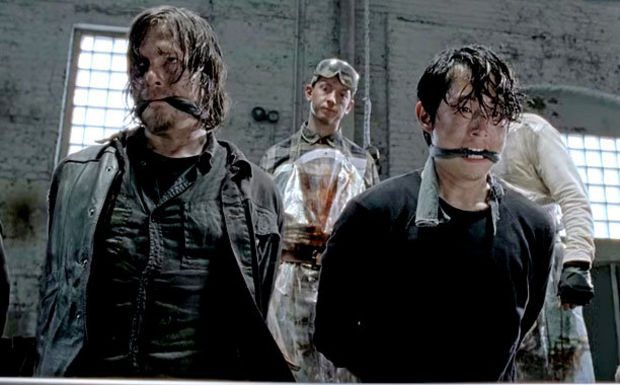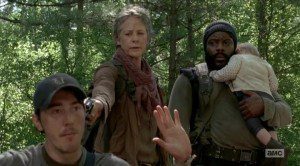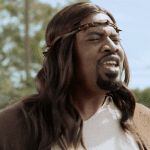 I know, I know. I wrote a short Walking Dead blog last week. But I recently watched the Season Five premiere “No Sanctuary” for review, and I kinda feel like talking about it.
I know, I know. I wrote a short Walking Dead blog last week. But I recently watched the Season Five premiere “No Sanctuary” for review, and I kinda feel like talking about it.
It was bloody. Boy howdy was it bloody. Heads bashed. Throats slit. People eaten alive. And we won’t even talk about what a bad episode it was for the undead. Even Dracula would look at the goings-on here and gone, “Ewwww!”
But the episode also wallowed into some pretty deep waters, exploring (as every season and perhaps every episode has, to some extent) on the nature of the human soul.
Aleksandr Solzhenitsyn once wrote that a line between good and evil cuts through every human soul, and it’s that line that characters walk in Dead. And as they do, the show asks some deeply profound questions: Is it possible to be good in such an evil world? What does it mean to be human? Are we, in the end, merely animals? Or is there something better in us?
The folks in Terminus posit a most disturbing answer to what it means to be human: Nothing.
“Either you’re the butcher or you’re the cattle,” we hear. People with the power survive the day. Those who not wind up as someone’s dinner. We are all just animals, and if one animal has that ability to kill another, that gives him the right to do so. Morality is meaningless, our Terminus’ers tell us. Survival is the only truth.
“You’re a good guy,” one tells Tyreese. “That’s why you’re gonna die today.”
Terminus learned about the primacy of survival the hard way. We’re told that Terminus started as a true sanctuary—a place of refuge for those surviving the zombie apocalypse. But the place was taken over by folks with the worst of intentions. After a period of rape and brutality, the original residents of Terminus won their sanctuary back—but it became a sanctuary only for people in their own group. They became the butchers. And in a makeshift memorial room for those who apparently died before, we see a set of brief mission statements for Terminus: “Never again.” “Never trust.” “We first always.”
For me, Terminus represents a reductive form of atheism. If there is no God, than we are animals. Survival is paramount, and anything done to ensure and safeguard that survival is justified. In the world presented to us in The Walking Dead, man-made morality hits a buzzsaw.
Of course, a land filled with zombies would naturally shake faith to its foundations, too. Many of Rick’s band of survivors still cling to a sort of faith—if not in God, in a belief in an overarching morality, that people can and should be better than the world they find themselves in. Each clings to a sort of hope that just doesn’t exist in Terminus, and while we hope for that hope, we fear that Terminus may have a point.
 An example: When Rick and his cohorts have the Terminus folks on the run (helped by a herd of zombies), they hear some shouting in a storage crate surrounded by zombies. “We gotta let those people out,” Glenn says. “That’s still who we are. It’s gotta be.”
An example: When Rick and his cohorts have the Terminus folks on the run (helped by a herd of zombies), they hear some shouting in a storage crate surrounded by zombies. “We gotta let those people out,” Glenn says. “That’s still who we are. It’s gotta be.”
But when they open the door, an unhinged man screams, “we’re the same! We’re the same!” Is he saying that Rick’s crew is really no different than those in Terminus? Or that they’re really the same as the zombies? No matter: Each answer is chilling.
Time and again, our band of survivors express hope even when things look pretty hopeless. They cling to faith—certainly faith in each other, perhaps faith in God, and for most, a faith that there’s more to humanity than being just butchers or cattle. Even now, in a land filled with the dead.
The conversation between Tyreese and his Terminus prisoner/assailant, is a mini-morality play. The Terminus guy tells Tyreese that he used to be normal. Human. He tells Tyreese he once had friends. He tells him, tellingly, that he used to go to church. “I can’t picture it anymore,” he admits, as if church was a symbol of his humanity that just fell away. He admits that, after a while, you get used to the world. You adapt to it.
“I haven’t gotten used to it,” Tyreese says.
“‘Course you haven’t,” the man says derisively. “You’re the kind of guy who saves babies.”
What we have here, finally, is a clash of cultures: Terminus has fully integrated into the way things are. Tyreese and the rest of our heroes have hope for something better—a return to the way things were, or a future where things will be better. They look toward Eden or heaven, because Earth—this earth—is not their home.
“We can put the world back to the way it was!” Bob Stookey tells the Terminus leader, when his throat’s about to be cut.
“You can’t go back, Bob,” the leader says.
The Walking Dead encourages our hope. We root for our characters to stay true to each other and, as much as they can, to whatever values they still cling to, devoid of that hope, we’d stop watching. And yet, the world the show gives us is horrific. In the end, Tyreese beats his Terminus adversary to death, crying out with each blow, “I won’t! I won’t!” Faith and hope are preyed upon just as much as the living.
But our characters continue to trust. And love. And believe that there’s a spark of divinity in them. As Glenn says, “that’s still who we are. It’s gotta be.” Because in the end, what other choice do they have? It reminds me of what Peter said to Jesus in one of the Bible’s most poignant passages: “Lord, to whom shall we go?”













